

A Breakthrough Study Just Linked Gut Bacteria to Neurovascular Disease. One thing we're not short on is research linking microbes living in our guts with the health of our brain and nervous system.

Unfortunately, most studies are either circumstantial, or largely rely on animal models. Now we have solid evidence in human volunteers that incidences of a rare neurovascular disease called cavernous angioma (CA) can be triggered by a particular mix of bacteria in our digestive tract. None of this is to say animal studies don't have their place. In fact, the research team behind the finding were inspired by investigations on mice that hinted at just such a connection. New Research Indicates Alzheimer's and Other Neurodegenerative Diseases Are Contagious - HMI.
NEW YORK, Sept. 23, 2016 – Alzheimer’s, cancer and other incurable diseases such as Parkinson’s and dementia can be contagious, according to researchers at the Human Microbiology Institute, who have published research linking the diseases to newly discovered bacterial viruses.
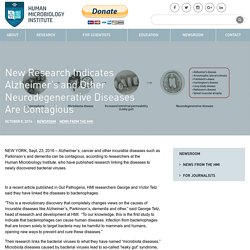
In a recent article published in Gut Pathogens, HMI researchers George and Victor Tetz said they have linked the diseases to bacteriophages. “This is a revolutionary discovery that completely changes views on the causes of incurable diseases like Alzheimer’s, Parkinson’s, dementia and other,” said George Tetz, head of research and development at HMI. “To our knowledge, this is the first study to indicate that bacteriophages can cause human diseases. Infection from bacteriophages that are known solely to target bacteria may be harmful to mammals and humans, opening new ways to prevent and cure these diseases.” Their research links the bacterial viruses to what they have named “microbiota diseases.” Human Microbiology Institute: Bacteriophages May Cause Neurodegenerative Diseases - HMI. Viruses Called Bacteriophages Affect Bacteria in Mammal Gut Environment and May Cause Human Diseases, a Study from Human Microbiology Institute Reveals NEW YORK, NY, July 12, 2017 — Viruses called bacteriophages affect bacteria that populate mammal gut environment and may cause human diseases, according to the Human Microbiology Institute (HMI).
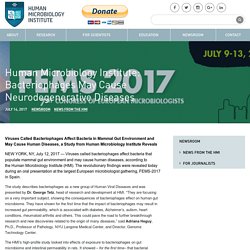
The revolutionary findings were revealed today during an oral presentation at the largest European microbiologist gathering, FEMS-2017 in Spain. The study describes bacteriophages as a new group of Human Viral Diseases and was presented by Dr. George Tetz, head of research and development at HMI. “They are focusing on a very important subject, showing the consequences of bacteriophages effect on human gut microbiome.
Study demonstrates role of gut bacteria in neurodegenerative diseases. Mechanisms of Molecular Mimicry Involving the Microbiota in Neurodegeneration. Abstract The concept of molecular mimicry was established to explain commonalities of structure which developed in response to evolutionary pressures.
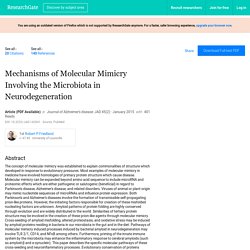
Most examples of molecular mimicry in medicine have involved homologies of primary protein structure which cause disease. Molecular mimicry can be expanded beyond amino acid sequence to include microRNA and proteomic effects which are either pathogenic or salutogenic (beneficial) in regard to Parkinson's disease, Alzheimer's disease, and related disorders. New term for role of microbiota in neurodegeneration proposed. How bacteria in the gut influence neurodegenerative disorders.
Poor Sleep and Alzheimer's Disease Risk. Is Alzheimer’s Caused By a Bacterial Infection of the Brain? Fungal infection in brain highly associated with Alzheimer’s disease — The American Microbiome Institute. Alzheimer’s disease is a brain disease in which slow and irreversible neuronal deterioration occurs.
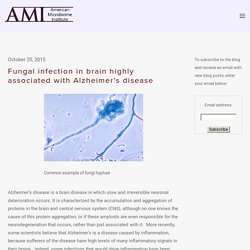
It is characterized by the accumulation and aggregation of proteins in the brain and central nervous system (CNS), although no one knows the cause of this protein aggregation, or if these amyloids are even responsible for the neurodegeneration that occurs, rather than just associated with it. More recently, some scientists believe that Alzheimer’s is a disease caused by inflammation, because sufferers of the disease have high levels of many inflammatory signals in their brains. Indeed, some infections that would drive inflammation have been found in Alzheimer’s patients, but nothing convincing as of yet. This week though, scientists from Spain discovered that a fungal infection in the brain is highly associated with the disease. They published their results in Nature Scientific Reports. Exploring the Association between Alzheimer’s Disease, Oral Health, Microbial Endocrinology and Nutrition. Introduction Alzheimer’s disease (AD) is the most common form of dementia, constituting 60%–80% of all cases.
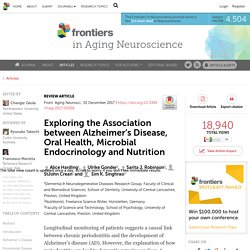
Due to the rising number of dementia cases and the paucity of adequate treatment for AD, emphasis for future management of this disease is on identification and modification of potential risk factors for AD onset and progression. Alzheimer’s Disease There are two forms of AD: the inherited form, with known genetic factors, and the sporadic form, with an unknown cause.
The sporadic form is the focus of this manuscript, as the vast majority of AD cases fall into this category. While clinically AD is described as “irreversible memory loss” a recent clinical study of the early intervention MEND™ protocol demonstrated reversal of the functional loss in the prodromal AD cases (Bredesen et al., 2016). Figure 1. Mouth Bacteria Linked to Alzheimer’s Disease, Study Suggests. Update Date: Jul 31, 2013 03:08 PM EDT According to the World Health Organization (WHO), dementia, which includes Alzheimer's disease, is expected to triple by 2050 with 115 million cases.

Due to the fact that there is no cure for dementia, preventing the onset of the disease is extremely important. Numerous studies have looked into factors that might contribute to Alzheimer's with the hopes that these findings can add more information and lead to better treatment options and preventable measures for the illness. Eleven Steps for Overcoming Alzheimer’s and Other Chronic Infectious Diseases.
New Research and Treatments for Parkinson’s Disease.